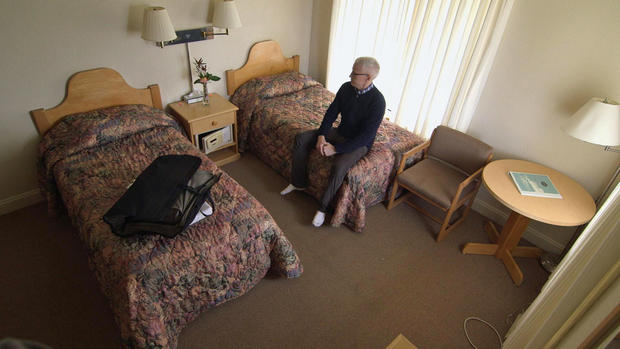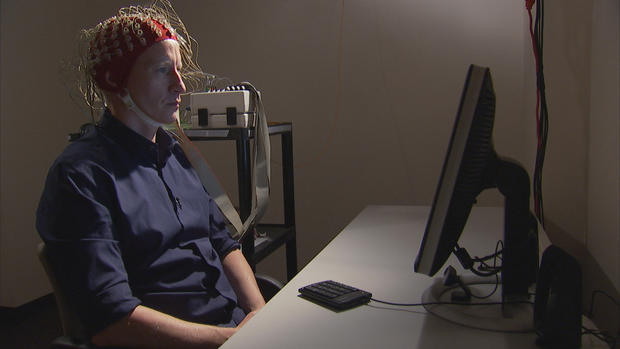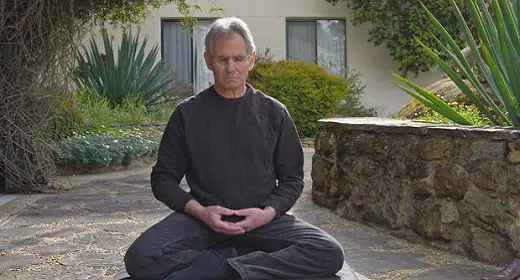Our lives are filled with distractions — email, Twitter, texting we’re constantly connected to technology, rarely alone with just our thoughts.
Which is probably why there’s a growing movement in America to train people to get around the stresses of daily life
It’s a practice called “mindfulness” and it basically means being aware of your thoughts, physical sensations, and surroundings.
Tonight, we’ll introduce you to the man who’s largely responsible for mindfulness gaining traction. His name is Jon Kabat-Zinn and he thinks mindfulness is the answer for people who are so overwhelmed by life, they feel they aren’t really living at all.
Jon Kabat-Zinn: There are a lot of different ways to talk about mindfulness, but what it really means is awareness.
Anderson Cooper: Is it being present?
Jon Kabat-Zinn: It is being present. That’s exactly what it is.
Anderson Cooper: I don’t feel I’m very present in each moment. I feel like every moment I’m either thinking about something that’s coming down the road, or something that’s been in the past.
Jon Kabat-Zinn: So ultimately all this preparing is for what? For the next moment, like the last moment, like, and then we’re dead (laugh) so in a certain way…
“There are a lot of different ways to talk about mindfulness, but what it really means is awareness.”
Anderson Cooper: Oh God, this is depressing.
Jon Kabat-Zinn: Are we going to experience while we’re still alive? We’re only alive now.
Jon Kabat-Zinn, is an MIT-trained scientist who’s been practicing mindfulness for 47 years. Back in 1979, he started teaching mindfulness through meditation to people suffering from chronic pain and illness. That program is now used in more than 700 hospitals worldwide.
Anderson Cooper: So how can you be mindful in your daily life?
Jon Kabat-Zinn: When your alarm goes off and you jump out of bed, what is the nature of the mind in that moment? Are you already like, “oh my God,” your calendar pops into your mind and you’re driven already, or can you take a moment and just lie in bed and just feel your body breathing. And remember, “oh yeah, brand new day and I’m still alive.” So, I get out of bed with awareness, brush my teeth with awareness. When you’re in the shower next time check and see if you’re in the shower.
Anderson Cooper: What do you mean check and see if you’re in the shower?
Jon Kabat-Zinn: Well, you may not be. You may be in your first meeting at work. You may have 50 people in the shower with you.
Kabat-Zinn says mindfulness takes practice…a lot of people start with a training class to learn how to meditate.
He agreed to teach us at a weekend retreat on a remote mountaintop in northern California.
When we arrived we were told there would be no television to watch, no Internet, not even an alarm clock.

[Congressman Ryan: So I’m checking in.]
The retreat was full of professionals – neuroscientists, business leaders, Silicon Valley executives.
Before we began we all had to surrender our last ties to the outside world.
Jon Kabat-Zinn: Put your devices in the basket. I’m contributing my MacBook Air and my iPhone. Happily.
I wasn’t exactly happy to give up my phone. I usually check emails several times an hour.
[Kabat-Zinn ringing a bell.]
Jon Kabat-Zinn: So let’s take a few minutes and just settle into an erect and dignified posture.
The retreat lasted three days and most of that time was spent just sitting there, silently meditating – with occasional guidance from Kabat-Zinn.
Jon Kabat-Zinn: There’s no place to go. There’s nothing to do. We’re just asking you to sit and know that you are sitting.
Knowing that you’re sitting may sound simple…turns out…it’s not. The mind constantly wanders.
Jon Kabat-Zinn: The mind has a life of its own. It goes here and there.
To not get lost in thought, Kabat-Zinn recommended focusing on the sensation of breathing in and out.
Jon Kabat-Zinn: Can we actually ride with full awareness on the waves of the breath — at the belly, at the nostrils and the chest. And then simply rest here in awareness.
“Resting in awareness” is one of those phrases used a lot by people who practice mindfulness. But when I tried to do it, it wasn’t restful and I worried I wasn’t doing it right. I kept thinking about work.
Anderson Cooper: I miss my cell phone. I’m having withdrawal, I must say.
Kabat-Zinn, who has written 10 books on mindfulness and led nearly a hundred retreats, describes meditation as a mental workout.
Jon Kabat-Zinn: The mind wanders away from the breath and then you gently and nonjudgmentally just bring it back.
Anderson Cooper: So it’s okay that the mind drifts away but you just bring it back.
Jon Kabat-Zinn: It’s the nature of the mind to drift away. The mind is like the Pacific Ocean, it waves. And mindfulness has been shown to drop underneath the waves. If you drop underneath the agitation in the mind, into your breath deep enough calmness, gentle undulations.
After hours of meditating in 30-minute sessions it does get easier. Those waves of thought Kabat-Zinn described – they’re still there but you get less distracted by them.
At breakfast, we spent time relearning some of the very basic things in life – including how to eat food. Eating a meal in complete silence is a little awkward, but without conversation as a distraction…you taste more and eat less.
This is something called “walking meditation.” The goal is to learn to be aware of each and every movement and feeling. I know it seems ridiculous, but it does change the way you experience walking.

Jon Kabat-Zinn: The Zen people from Ancient China, “When you’re walking, just walk.” It turns out to be the hardest thing.
Anderson Cooper: That’s an ancient saying?
Jon Kabat-Zinn: When you’re walking, just walk. When you’re eating, just eat. Not in front of the TV, not with the newspaper. It turns out, that’s huge.
Congressman Tim Ryan, an Ohio Democrat, says mindfulness might look a lot like nothing, but he really believes it can change America for the better.
He attended his first meditation retreat in 2008, just days after winning a grueling reelection campaign.
“When you’re walking, just walk. When you’re eating, just eat. Not in front of the TV, not with the newspaper. It turns out, that’s huge.”
But being mindful at a retreat is one thing, we wondered if, back in Washington, Congressman Ryan ever worries about how all this looks…
Tim Ryan: Well, you know, I can see myself in high school going, “Whoa. Stay away from those guys.” (laugh)
Anderson Cooper: So, how do you use it here on Capitol Hill?
Tim Ryan: I’m on the budget committee, for example. There’s a lot of conflict. And people say things that get you ramped up. I find myself, as my body clenches up when somebody says something that I know is wrong or I– I wanna catch them in a lie or whatever, that just, “Calm down. When it’s your turn, you make your point.”
[Ryan in Congress
Tim Ryan: Hey man.]
You don’t hear the words “calm” and “Congress” together very often, but Ryan is trying to change that. He hosts weekly meditation sessions open to members and staff of both parties.
[Mindfulness leader: Now shifting the attention to take in the entire body.]
Anderson Cooper: Have you gotten any Republican Congressmen in to meditate with you yet?
Tim Ryan: No. [laugh] We’re working on it.
He’s written a book about mindfulness and obtained a million dollars of federal funding to teach it to school children in his Ohio district.
[Tim Ryan with kids in classroom
Girl: I feel like we are calm right now.
Tim Ryan: Yes you are.]
Tim Ryan: I’ve seen it transform classrooms. I’ve seen it heal veterans. I’ve seen what it does to individuals who have really high chronic levels of stress and how it has helped their body heal itself. I wouldn’t be willing to stick my neck out this far if I didn’t think this is “The Thing” that can really help shift the country.
Anderson Cooper: To some people though this may sound like kind of New Age gobbledygook?
Jon Kabat-Zinn: Yeah, there’s so many different compelling studies that are showing that this not New Age gobbledygook, this is potentially transformative of our health and well-being psychologically as well as physically. It can be useful for anxiety, depression, stress reduction.
There have been a number of studies that show mindfulness can lead to those benefits, as well as improvements in memory and attention.
And, at the University of Massachusetts, Judson Brewer, a psychiatrist and neuroscientist, uses mindfulness to treat addiction.
Judson Brewer: This is just the next generation of exercise. We’ve got the physical, you know, exercise components down. And now it’s about working out how can we actually train our minds.
Dr. Brewer is trying to understand how mindfulness can alter the functioning of the brain.
He uses a cap lined with 128 electrodes.

Judson Brewer: We going to start filling each of these 128 wells with conduction gel.
The electrodes are able to pick up signals from the posterior cingulate, part of a brain network linked to memory and emotion.
Judson Brewer: This is all just picking up electrical signal from the top of your head.
Since attending the mindfulness retreat, I’d been meditating daily and was curious to see if it had an impact on my brain.
Judson Brewer: We’re going to have you start with thinking of something that was very anxiety provoking for you.
Anderson Cooper: OK.
When I thought about something stressful, the cells in my brain’s posterior cingulate immediately started firing — shown by the red lines that went off the chart on the computer screen.
Judson Brewer: Just drop into meditation.
Anderson Cooper: OK.
When I let go of those stressful thoughts, and re-focused on my breath…within seconds the brain cells that had been firing quieted down — shown by the blue lines on the computer.
Anderson Cooper: That’s really fascinating to see it like that.
Dr. Brewer believes everyone can train their brains to reach that blue, mindfulness zone, but he says, all the technology we’re surrounded by makes it difficult.
Judson Brewer: If you look at people out on the street, if you look at people at restaurants, nobody’s having conversations anymore. They’re sitting at dinner looking at their phone, because their brain is so addicted to it.
Anderson Cooper: You really think there’s something in the brain that’s addicted to that?
Judson Brewer: Well, it’s the same reward pathways as addiction, absolutely.
Anderson Cooper: I’m on mobile devices all day long. I feel like I could go through an entire day and not be present.
Judson Brewer: And what’s that like?
Anderson Cooper: It’s exhausting.
Judson Brewer: So all of this is leading to a societal exhaustion.
The irony is, many of the people responsible for creating the gadgets that distract us are themselves practicing mindfulness. More than 2,000 people from companies like Google, Facebook and Instagram showed up earlier this year in San Francisco for a mindfulness conference called Wisdom 2.0.
[Announcer: Please welcome our guests.]
Karen May is a Google vice president, and that’s Chade-Meng Tan a former engineer whose become kind of a mindfulness guru. And as could only happen at a place like Google, his actual title is “Jolly Good Fellow.”
Chade-Meng Tan: Which nobody can deny.
Anderson Cooper: So, what does a Jolly Good Fellow do?
Chade-Meng Tan: My job description is to enlighten minds, open hearts and create world peace.
Anderson Cooper: That’s your job description?
Chade-Meng Tan: That’s my job description.
Anderson Cooper: I’ve heard that at some meetings at Google you actually start out with moments of silence.
Karen May: We do.
Anderson Cooper: How long do sit there quietly for?
Karen May: It’s literally a minute or two of noticing your breathing, calming yourself down, being present. And then you’re able to go into the meeting, the business at hand, with a little bit more focus.
Anderson Cooper: Does it make people more productive?
Chade-Meng Tan: Yes, it does. When the mind is un-agitated, when the mind is calm, that mind is most conducive to creative problem solving.
Anderson Cooper: –to innovate?
Chade-Meng Tan: Correct. And one of the powers of mindfulness is the ability to get to that frame of mind on demand.
So along with their free health clubs and other company perks…Google now offers their 52,000 employees free lessons in mindfulness.
Chade-Meng Tan: In the middle of stress, when everything is falling apart. You can take one breath.
Anderson Cooper: I can imagine some people rolling their eyes and saying, “Oh, come on, of course, like, you know, at Google, you guys have tons of money, there’s massage therapists walking around and all sorts of nice things for employees, but it just doesn’t seem practical.”
Karen May: The advantage of this is it actually doesn’t cost anything and it doesn’t take much time.
Anderson Cooper: And you believe it really works?
Karen May: I absolutely believe it works.
After nearly four decades of teaching mindfulness, Jon Kabat-Zinn is happy to see it hitting the mainstream. But if you’re starting to think mindfulness is something you should start practicing, he says you may be missing the point.
Jon Kabat-Zinn: It’s not a big should. It’s not like, “Oh I gotta, now one more thing that I have to put in my life. Now I have to be mindful.”
Anderson Cooper: And if it becomes that one more thing they gotta do after they take the yoga class?
Jon Kabat-Zinn: They shouldn’t do it. Just don’t do it. Don’t do it. It’s not a doing at all, in fact, it’s a being. And being doesn’t take any time.




















































